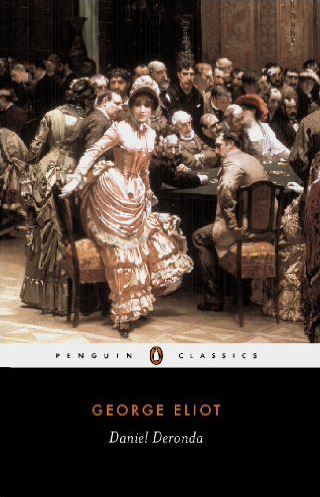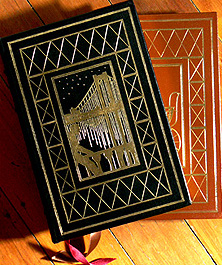I’ve been trying to decide whether to include George Eliot’s final and most controversial novel, Daniel Deronda, on the 17th Street book blogs since I finished reading it over a month ago. Although Caleb Carr has never mentioned George Eliot as an inspiration for his work, this challenging novel explores several themes that may be of interest to Alienist readers. As a result, for the 11th anniversary of 17th Street, I have decided to go ahead and share my thoughts on one of the most fascinating psychological studies of human character, relationships, and society that I’ve read to date.
What’s it about?
Gwendolen Harleth is about to gamble away her family fortune at the roulette table when she notices the enigmatic Daniel Deronda watching her from across the room. From this moment on, the stories of these two contrasting protagonists become intertwined as they face challenges that take them down very different paths. Although the unconventional Gwendolen makes choices that might appear to be conservative on the surface, they lead her into realms of moral uncertainty from which she struggles to escape. On the other hand, the extremely conventional Daniel’s search for belonging and identity is taken down an unexpected and unconventional path when he encounters a young Jewish woman who is also searching for her family.
George Eliot states early in the novel that, “Men, like planets, have both a visible and an invisible history.” In the way she masterfully charts the stories of these two fascinating characters, Eliot successfully demonstrates that it is indeed possible to “thread the hidden pathways of feeling and thought which lead up to every moment of action, and those moments of intense suffering which take the quality of action — like the cry of Prometheus, whose chained anguish seems a greater energy than the sea and sky he invokes and the deity he defies.”
My thoughts
Daniel Deronda, Chapter 51
“Oh — the reasons for our actions! … When you are as old as I am, it will not seem so simple a question — ‘Why did you do this?’ People talk of their motives in a cut and dried way. Every woman is supposed to have the same set of motives, or else to be a monster. I am not a monster, but I have not felt exactly what other women feel — or say they feel, for fear of being thought unlike others. When you reproach me in your heart for sending you away from me, you mean that I ought to say I felt about you as other women say they feel about their children. I did not feel that. I was glad to be freed from you.”
For any visitors who have read The Angel of Darkness, my decision to open this book blog with the preceding quote should go a long way toward explaining why I feel this novel may be of interest to Alienist readers. While the role of women in society, and more particularly the role that mothers play in their children’s development, are prominent themes in The Alienist, they become the central themes in The Angel of Darkness when we encounter a woman whose struggles in this area motivate her criminal behaviour. Moreover, in both books Sara Howard’s character helps readers understand the feeling of frustration many women in the nineteenth century would have experienced at the expectation that women needed to marry and have children in order to be considered ‘whole’.
As the preceding quote suggests, several of the women in Daniel Deronda share these sentiments, and do not conform to the nineteenth century’s ideal for womanhood, particularly with regard to having children. Indeed, the novel’s protagonist, Gwendolen Harleth, describes early in the novel just how limited the options were for women in the nineteenth century, and how frustrating this could be for women of a more independent or spirited temperament.
| Continue reading →


